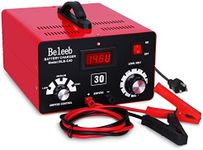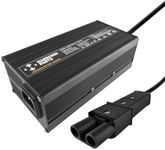Buying Guide for the Best 48 Volt Golf Cart Battery Charger
Choosing the right 48-volt golf cart battery charger is important to keep your golf cart running smoothly and to extend the life of your batteries. The right charger will ensure your batteries are charged efficiently and safely, without overcharging or undercharging. When shopping for a charger, it's important to understand the key features and specifications that affect performance and compatibility with your golf cart and battery type.Output VoltageOutput voltage refers to the amount of electrical pressure the charger delivers to the batteries. For a 48-volt golf cart, you need a charger that matches this voltage exactly. Using a charger with a different voltage can damage your batteries or the charger itself. Always check your golf cart’s battery system to confirm it is 48 volts before purchasing a charger.
Output Amperage (Current)Output amperage, measured in amps, determines how quickly the charger can recharge your batteries. Lower amperage chargers (8-12 amps) charge more slowly and are gentler on batteries, making them suitable for overnight charging or for carts that are used infrequently. Higher amperage chargers (15-25 amps) charge faster, which is useful if you use your cart often and need quick turnaround times. However, frequent fast charging can reduce battery lifespan over time. Choose the amperage based on how quickly you need your cart ready and how often you use it.
Battery Type CompatibilityGolf cart batteries can be lead-acid, AGM, or lithium-ion, and each type requires a charger with a compatible charging profile. Using the wrong charger can lead to poor charging performance or even damage the batteries. Always check your battery type and ensure the charger is designed to work with it. Some chargers are versatile and can handle multiple battery types, while others are specific to one type.
Automatic Shutoff and Smart ChargingAutomatic shutoff and smart charging features help prevent overcharging, which can damage batteries and reduce their lifespan. Smart chargers monitor the battery’s charge level and automatically stop or switch to a maintenance mode when the battery is full. This is especially important if you tend to leave your charger connected for long periods. Look for chargers with these features for added safety and convenience.
Connector TypeThe connector is the plug that attaches the charger to your golf cart. Different golf carts use different connector types, so it’s important to match the charger’s connector to your cart’s charging port. Common types include round, rectangular, and specific proprietary designs. Check your cart’s connector before buying to ensure compatibility.
Portability and Build QualityPortability refers to how easy it is to move and store the charger. If you need to transport your charger frequently, look for a compact and lightweight model with a sturdy handle. Build quality is also important for durability, especially if the charger will be used outdoors or in a garage. A well-built charger with good weather resistance will last longer and provide more reliable service.
Safety FeaturesSafety features such as short-circuit protection, overcurrent protection, and thermal protection help prevent accidents and protect both the charger and your batteries. These features are especially important if the charger will be used in environments where electrical safety is a concern. Look for chargers that clearly list their safety certifications and protections.













